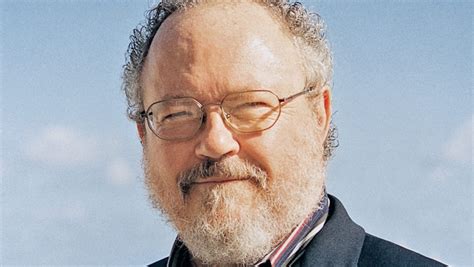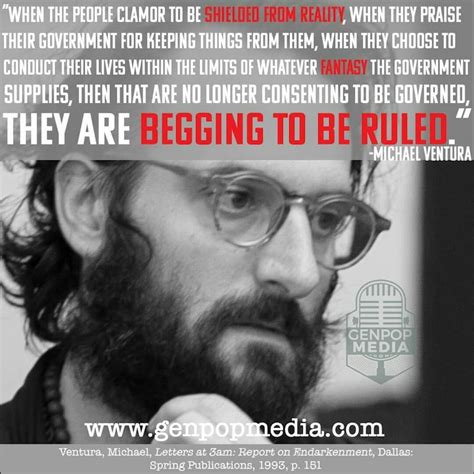Top 389 Static Quotes & Sayings - Page 7
Explore popular Static quotes.
Last updated on April 17, 2025.
Where some may see flat, static narratives, I see a spectrum of tonal gradations and realities. What I am creating is literally black portraiture with ballpoint pen ink. I'm looking for that in-between state in an individual where the overarching definition is lost. Skin as geography is the terrain I expand by emphasizing the specificity of blackness, where an individual’s subjectivity, various realities and experiences can be drawn onto the diverse topography of the epidermis. From there, the possibilities of portraying a fully-fledged person are endless.
Whenever commandments are given they create difficulties for people, because by the time they are given they are already out of date. Life moves so fast; it is a dynamism, it is not static. It is not a stagnant pool, it is a Ganges, it goes on flowing. It is never the same for two consecutive moments. So one thing may be right this moment, and may not be right the next. Then what to do? The only possible thing is make people so aware that they themselves can decide how to respond to a changing life.
Spaces devoted to Hannibal Lecter’s earliest years differ from the other archives in being incomplete. Some are static scenes, fragmentary, like painted attic shards held together by blank plaster. Other rooms hold sound and motion, great snakes wrestling and heaving in the dark and lit in flashes. Pleas and screaming fill some places on the grounds where Hannibal himself cannot go. But the corridors do not echo screaming, and there is music if you like.
Clichés are static, the emotion behind them long spent. If you are tempted to use them, here is a saying of my mother’s: Fang pi bu-cho, cho pi bu-fang. Basically that translates to: "Loud farts don’t stink, and the really smelly ones don’t make a sound." In other words: When you’re full of beans, you just blow a lot of hot air. If you want to have a real impact, be deadly but silent. Oh, also recognize the difference between a bad cliché and a good quotation. My mother’s saying is a good quotation. You should use it often.
One of the most destructive forces in the world is love. For the following reason: The world is a conglomeration of objects, no, of events and the approachings of events towards objects, therefore of becoming stases static stagnant, of all that is unreal. You get in the world, you get your daily life your routine doesn’t matter if you’re rich poor legal illegal, you begin to believe what doesn’t change is real, and love comes along and shows all these unchangeable for ever fixtures to be flimsy paper bits. Love can tear anything to shreds.
The American Dream can no more remain static than can the American nation.... We cannot any longer take an old approach to world problems. They aren't the same problems. It isn't the same world. We must not adopt the methods of our ancestors; instead, we must emulate that pioneer quality in our ancestors that made them attempt new methods for a New World.
You have so much going on. It comes off like a..." "Static?" I suggested. "Exactly!" He snapped his fingers and pointed at me. "You need to tune it, get your frequencies in check, like a radio." "I would love to.Just tell me how." "It's not a matter of turning a dial. You have no on or off switch." He walked around in a large lazy circle. "It's something you have to practice. It's more like being potty-trained. You have to learn when to hold it and when to release." "That's a pretty sexy analogy," I said.
I recognize thart even you, yourself, will change. Your ideals will change, your tastes will change, your desires will change. Your whole understandings of who you are had better change, because if it doesn't change, you've become a very static personality over a great many years, and nothing would displease me more. And so I recognize that the process of evolution will produce changes in you.
You really get caught up in this system of the world - the Instagram world, society - we really get caught up in what our friends want and what our jobs want. I think the priority in life is to feel secure and safe and solid, truly. Just feeling good, just being okay with sitting alone. I think that's a big thing people need to realize and get used to that it's okay to be alone. It's good to be alone, and you need to be able to sit by yourself and just be peaceful and silent, and learn to read a book again; learn to just be. It's hard to be when you are so used to static input.
These things - the degree of vulnerability, the degree of skill, the degree of the longing to give - are influx all the time, And to lump all that under the word "creativity" assumes something much more static than it is. That's why an artist may be marvelous in her 20s, and be creating automatic crap in her 40s. A writer may be trivial in his 20s, and be writing incredibly in his 50s, because those things are always in flux.
Evolution is the only thing that exists through time. That is true for computers, or people, or a business. We tend to see things in a static way, and so you see what is. Even in looking at ourselves, what we really are is essentially vessels for our DNA that keeps evolving through time. So seeing that and embracing that reality, and thinking of everything as kind of this perpetual motion machine in which you embrace reality - you don't wish it was different. You realize that it's your puzzle to interact with. You interact with it well, you evolve yourself.
They would always be a family, but if she'd learned anything in the past few weeks it was that a family wasn't a static thing. There were always changes going on. Like with continents, sometimes the changes were invisible and underground, and sometimes they were explosive and deadly. The trick was to keep your balance. You couldn't control the direction of your family any more than you could stop the continental shelf from breaking apart. All you could do was hold on for the ride.
If you have a radio, the next three months is a good time to have it quit working. All you will hear from now until the 4th of November will be: 'We must get our government out of the hands of predatory wealth.' 'The good people of this great country are burdened to death with taxes. Now what I intend to do is ...' What he intends to do is try and get elected. That's all any of them intend to do. Another one that will hum over the old static every night will be: 'This country has reached a crisis in its national existence.'
If things do not exist as fixed, independent entities, then how can they die? Our notion of death as the sudden expiration of that which was once so real starts to unwind. If things do not exist in their own right and are flickering rather than static, then we can no longer fear their ultimate demise. We may fear their instability, or their emptiness, but the looming threat of death starts to seem absurd. Things are constantly dying, we find. Or rather, they are constantly in flux, arising and passing away with each moment of consciousness.
By declaring our Prophet infallible and not permitting ourselves to question him, we Muslims had set up a static tyranny. The Prophet Muhammad attempted to legislate every aspect of life. By adhering to his rules of what is permitted and what is forbidden, we Muslims supressed the freedom to think for ourselves and to act as we chose. We froze the moral outlook of billions of people into the mindset of the Arab desert in the seventh century. We were not just servants of Allah, we were slaves.
What a shame that Christianity had come here!If the white man had not intruded where he was not wanted, where he did not belong, even now protected by the mountains and the river,the village would have remained a last stronghold of a culture which was almost gone.Mark tried to say that no village,no culture can remain static. I have often thought that if this lively and magnificent land belongs to anyone,it's to the birds and the fish.They were here long before the first Indian and when the last man is gone from the Earth,it will be theirs again.
Memory implies that there is some static time and place you can go back to, whereas if you relive it by trying to put yourself back in that context, its more nuanced, less black and white. More traumatic, but also more exciting. When I knew I had to write about things that would be painful, I put off doing it for ages. But then eventually the fear of not doing it becomes greater than the fear of doing it.
It is a simple matter to see the obvious, to do the expected. The tendency of the individual life is to be static rather than dynamic, and this tendency is made into a propulsion by civilization, where the obvious only is seen, and the unexpected rarely happens. When the unexpected does happen, however, and when it is of sufficiently grave import, the unfit perish. They do not see what is not obvious, are unable to do the unexpected, are incapable of adjusting their well-grooved lives to other and strange grooves. In short, when they come to the end of their own groove, they die.
It is the fragrant lack of practicality that makes high-heeled shoes so fascinating: in terms of static mechanics they induce a sort of insecurity which some find titillating. If a woman wears a high-heeled shoe it changes the apparent musculature of the leg so that you get an effect of twanging sinew, of tension needing to be released. Her bottom sticks out like an offering. At the same time, the lofty perch is an expression of vulnerability, she is effectively hobbled and unable to escape. There is something arousing about this declaration that she is prepared to sacrifice function for form.
I like to borrow a metaphor from the great poet and mystic Rumi who talks about living like a drawing compass. One leg of the compass is static. It is fixed and rooted in a certain spot. Meanwhile, the other leg draws a huge wide circle around the first one, constantly moving. Just like that, one part of my writing is based in Istanbul. It has strong local roots. Yet at the same time the other part travels the whole wide world, feeling connected to several cities, cultures, and peoples.
It is with great satisfaction that I have signed into law the Social Security Amendments of 1961. They represent an additional step toward eliminating many of the hardships resulting from old age, disability, or the death of the family wage-earner. A nation's strength lies in the well-being of its people. The Social Security program plays an important part in providing for families, children, and older persons in time of stress, but it cannot remain static. Changes in our population, in our working habits, and in our standard of living require constant revision.
Do not allow past experiences to be imprinted on your mind. Perform asanas each time with a fresh mind and with a fresh approach. If you are repeating what you did before, you are living in the memory, so you are living in the past. That means you don't want to proceed beyond the experience of the past. Retaining that memory is saying, 'Yesterday I did it like that.' When I ask, 'Is there anything new from what I did yesterday?' then there is progress. Am I going forward or am I going backward? Then you understand how to create dynamism in a static asana.
Now, almost one hundred years later, it is difficult to fully appreciate how much our picture of the universe has changed in the span of a single human lifetime. As far as the scientific community in 1917 was concerned, the universe was static and eternal, and consisted of a one single galaxy, our Milky Way, surrounded by vast, infinite, dark, and empty space. This is, after all, what you would guess by looking up at the night sky with your eyes, or with a small telescope, and at the time there was little reason to suspect otherwise.
Individuals inherit a particular space within an interlocking set of social relationships; lacking that space, they are nobody, or at best a stranger or an outcast. To know oneself as such a social person is however not to occupy a static and fixed position. It is to find oneself placed at a certain point on a journey with set goals; to move through life is to make progress - or to fail to make progress - toward a given end.
In Islamic belief, knowledge is two-fold. There is that revealed through the Holy Prophet (s.a.s.) and that which man discovers by virtue of his own intellect. Nor do these two involve any contradiction, provided man remembers that his own mind is itself the creation of God. Without this humility, no balance is possible. With it, there are no barriers. Indeed, one strength of Islam has always lain in its belief that creation is not static but continuous, that through scientific and other endeavours, God has opened and continues to open new windows for us to see the marvels of His creation
Usually it's lyric first, but sometimes it's melody. And I carry a hand-held recorder everywhere I go so I can just hum or whistle a melody if one hits me. Sometimes it's both simultaneously - lyric and melody at the same time - those are a little confusing to me, but sometimes it comes in that form. I just feel like I have my own little radio station and sometimes the static clears and something beams in from out there.
To express dynamic motion through a static moment became for me limited and unsatisfactory. The basic idea was to liberate myself from this old concept and arrive at an image in which the spectator could feel the beauty of a fourth dimension, which lies much more between moments than within a moment. In music one remembers never one tone, but a melody, a theme, a movement. In dance, never a moment, but again the beauty of a movement in time and space.
I think a play can do almost anything, because it's also a static form, much more so than in a movie. In a movie you can move the scenery, you can do anything any way. A cartoon, happens in a limited amount of space and a limited amount of time, and you can only get so many words before the reader's gonna get impatient. All of these forms that I enjoy are in a sense a slight of hand, where you have to suggest much more than you really show. You have to, in a sense, seduce the reader and trick the reader or the audience into going with you.
Knowledge about yourself binds, weighs, ties you down; there is no freedom to move, and you act and move within the limits of thatknowledge. Learning about yourself is never the same as accumulating knowledge about yourself. Learning is active present and knowledge is the past; if you are learning to accumulate, it ceases to be learning; knowledge is static, more can be added to it or taken away from it, but learning is active, nothing can be added or taken away from it for there is no accumulation at any time.




























